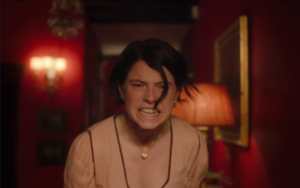 You can’t spell “menacing” without the word “men.”
You can’t spell “menacing” without the word “men.”
The new Jessie Buckley psychological thriller, now playing in theatres, takes a look at toxic relationships and gender politics through the lens of British folk horror and surreal body terror.
Buckley is Harper, a young widow smarting from the death of her husband James (Pappa Essiedu) by suicide. To heal her soul, she rents a 500-year-old house in the English countryside. Miles from anywhere—“The pub is ten minutes down the road,” says her socially awkward landlord Geoffrey (Rory Kinnear), “thirty minutes on the way back.”—the tranquil surroundings should be a balm, but she is haunted by visions of the last moments she spent with her controlling, abusive husband.
On the verge of a divorce he didn’t want, they argued. “I’ll kill myself,” he says, “and you’ll have to live with my death. That’s not a threat, it’s a warning.”
Minutes later, he plunges to his death, changing Harper’s life forever.
At the rental house Harper has a close call with a scarred, bloodied and naked man she thinks is stalking her. The local police assure her she is not in danger, and yet unsettling things continue to happen, including a run in with a rude boy in a Marilyn Monroe mask, microaggressions, stand-offish men in town and the world’s most unhelpful vicar, whose advice is not exactly welcome.
The trip to the country culminates in a hallucinogenic sequence that combines body horror (the kind that might make David Cronenberg envious), British folk horror, pagan imagery and even some stunt driving.
“Men” feels like two movies. The first half is a domestic drama, a divorce turned ugly, played out in flashbacks. The idyll of the country retreat, featuring long dialogue-free sequences, is briefly interrupted by memories and some rather creepy men. It is uncomfortable but earthbound.
The second part, which makes up the film’s last third, is a grotesque, surreal psychological thriller with images best seen after you’ve finished your popcorn and Twizzlers. Director and writer Alex Garland gruesomely and memorably (perhaps a little too memorably) illustrates a never-ending cycle of male rebirth into crisis and toxicity. It’s never clear where the metaphor starts or ends and the head trip begins, but the message of menacing toxic masculinity is made bloody clear (literally).
Both sides of the story have interesting moments, most courtesy of Buckley, the rare effortless performer whose face contains multitudes, but despite some memorable flourishes, they don’t feel like a whole. It’s like there is a puzzle piece missing in the storytelling. As a result, “Men” is interesting, but isn’t exactly an effective genre film or study of trauma.
“Midsommar,” the creepy new film from “Heredity” director Ari Aster, is proof positive that not all scary stuff happens under the cover of darkness. Sometimes daylight can illuminate the true horror of a situation in even more terrifying ways.
In the wake of a family tragedy American grad student Dani (Florence Pugh) finds out about her aloof boyfriend’s Christian (Jack Reynor) secret holiday, a trip to Sweden. Christian has one foot outside the relationship but half-heartedly asks her along. “I invited Dani to come to Sweden,” he tells his friends, “just to not make it weird. She’s not actually coming.”
But she does go with Jack and fellow anthropology students Josh (William Jackson Harper), a PhD student gathering info for his thesis, and wannabe-playboy Mark (Will Poulter) to a midnight sun celebration in the remote hometown of school mate Pelle (Vilhelm Blomgren). “It’s sort of a crazy festival,” Pelle says. “It only happens every ninety years. Lots pf pageantry, special ceremonies and dressing up.”
The festival is a Scandinavian Coachella, complete with dancing, pan-flute music and hallucinogenic drugs, all under a blazing sun that never sets. “This is a once-in-a-lifetime thing and I wanted to share it with my friends,” Pelle says. “People I know would appreciate it.”
At first it’s hospitable—”Welcome and happy Midsommar,” says the Ceremony Leader. “Skål!”—but after the and fun and games—and psychotropic mushrooms—start to wear off a gradual air of menace settles over the proceedings as the tone shifts from Burning Man to “The Wicker Man” as a secret pagan agenda is revealed.
“Midsommar” is a tough movie to categorize. It’s not exactly a horror film although there are some horrifying moments. It’s more the story of Dani, a woman trapped in a loveless relationship, (SPOILER ALERT) who lost one family only to find another under very strange circumstances. Elements of high school rom coms and revenge films echo throughout.
Aster, a master of mood, slowly unveils how the unusual customs of the villagers unsettle their American guests. His film asks questions about the relationship the Swedes have with their surroundings and traditions. The circle of life brings joy for them, not terror and the pious, matter-of-fact way they deal with death as a sacrament suggests the North Americans fear the situation simply because they don’t understand the customs. Are they the ultimate Ugly Americans or are they actually in danger? That’s the push and pull that builds the tension leading up to the explosive climax.
“Midsommar” may be the definition of ‘not for everyone.’ A colleague, who has sat through more movies with me than either of us could possibly remember, declared it one of the worst films she’s ever seen. But that is the subjectivity of art, the polarizing nature of a film that doesn’t easily fit into any definable category.
 You can’t spell “menacing” without the word “men.”
You can’t spell “menacing” without the word “men.”